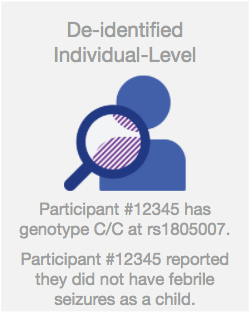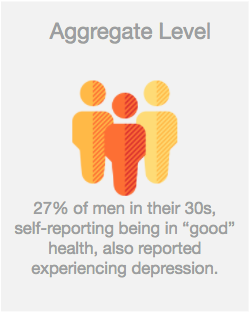This article addresses six key questions regarding the Individual Data Sharing Consent Document:
What is the difference between the Consent Document and the Individual Data Sharing Consent Document?
When you agree to participate in 23andMe Research via our Research Consent Document, you consent to the use of your de-identified Genetic & Self-Reported information by 23andMe Researchers for 23andMe Research. You also allow 23andMe to share de-identified data summarized among many others’ data with external research partners and in scientific publications.
If you also choose to agree to the Individual Data Sharing Consent Document, you are giving 23andMe permission to share your de-identified, individual-level data with approved, qualified research collaborators outside of 23andMe. In other words, your de-identified Genetic Information and/or Self-Reported Information, which will not be linked to your Registration Information (like name, email address, and contact information), will be shared on its own, rather than as a part of a summary.
This will allow select qualified research collaborators outside of 23andMe to study this data, which will hopefully accelerate research and discoveries even further. It’s important to remember that 23andMe researchers and qualified research partners who conduct analyses do not have access to Registration Information, such as your name or contact information.

What is de-identified, individual-level data?
The information shared with our partners never includes your name or contact information. Removing your personal information and replacing it with random ID’s, like ‘12345’ is called de-identification. De-identification is a common practice for researchers to protect the identity of individuals. By de-identifying data sets, it makes it very hard to nearly impossible to connect the remaining data points to an individual.
| Type of Information Shared by Consenting to the Individual Data Sharing Consent Document | Type of Information Shared by Consenting to the Research Consent Document |
 |
 |
|
An example of the type of information shared with qualified research collaborators if you consent to the Individual Data Sharing Consent. Individual means a single person’s genetic data, diseases, or other traits/characteristics. |
An example of the type of information shared with qualified research collaborators if you consent only to the Research Consent Document. Aggregated means grouped together with others so no individual information is listed on its own. |
Why is individual-level information helpful to research collaborators?
Many types of studies and analyses require individual-level data. Research is about iterative experimentation, and researchers often tweak variables and explore the data in order to reach the right answer. Sharing individual-level data with collaborators helps further 23andMe’s mission, to accelerate the pace of research, by allowing researchers beyond 23andMe to study, and analyze and explore this data.
Sharing individual-level information with other researchers opens up the amount of research that can be done by the collective brainpower of the entire research community. This may increase the chances that meaningful scientific discoveries are made and improve our understanding of human disease and biology, human populations, and possibly support the development of preventative measures or treatments.
As an example, 23andMe collaborates with the Michael J. Fox Foundation on Parkinson’s Research. This research requires individual-level consent, and will hopefully yield breakthroughs in disease research.
"De-identified individual data provides a level of disease understanding that aggregate data cannot. This is particularly true as we aim to connect a person’s genetics to their daily lived experience with disease, which can help us develop and test new, personalized treatments,”
- Todd Sherer, PhD, CEO of The Michael J. Fox Foundation.
Do I need to consent to the Individual Data Sharing Consent Document if I want to participate in 23andMe Research?
No, if you want to contribute to 23andMe Research, you need only consent to our Research Consent Document. You may choose to accept the Individual Data Sharing Consent Document if you would like to share your de-identified, individual-level data with researchers outside of 23andMe.
Can I change or withdraw my consent in the future?
Yes, you may withdraw your consent to participate in 23andMe Research, or withdraw your consent to Individual Level Data Sharing Consent Document, at any time from within your 23andMe Account Settings. Choosing not to give consent or withdrawing from 23andMe Research will not affect your access to your Genetic Information or to the Personal Genetic Service.
Your consent selection is displayed on your Settings page; to change your consent, click the change consent link that appears where you current consent status is displayed.

To withdraw your consent to 23andMe Research entirely, change your consent status to our Consent Document from within your 23andMe Account Settings.
If you withdraw only your consent to the Individual Data Sharing Consent Document your information will still be used for 23andMe Research as detailed in our Consent Document.
Is my information secure when it’s transferred and stored by a third party?
We have strong security measures in place to ensure your data are transferred safely. 23andMe also has agreements with all collaborators regarding the security and storage of data that we share. Although 23andMe cannot provide a 100% guarantee that your data will be secure, 23andMe policies and procedures minimize the chance that a breach could take place.
Want to take another look at the consent documents?
Individual Data Sharing Consent Document